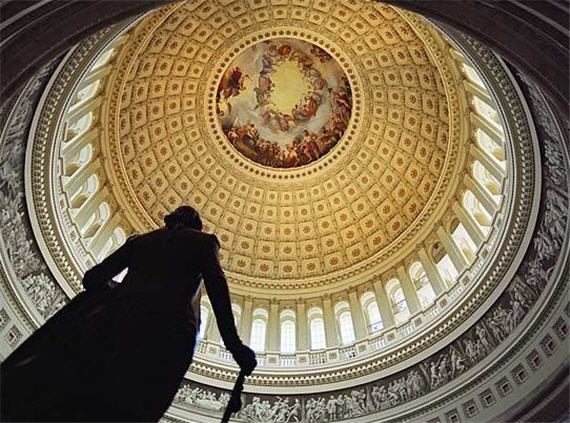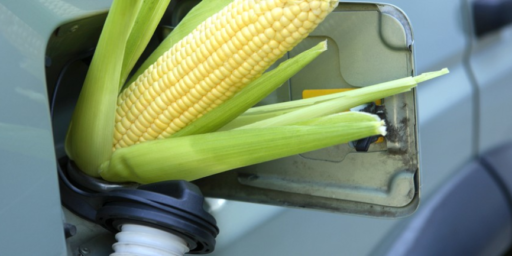Senate Votes To End Ethanol Subsidies, White House Threatens Veto
It’s rare when Congress actually does something I completely agree with, so I will take the time to congratulate the United States Senate on its vote today to end ethanol subsidies:
WASHINGTON (Reuters) – The Senate voted overwhelmingly on Thursday to eliminate billions of dollars in support for the U.S. ethanol industry, sending a strong message that the era of taxpayer support for biofuels is ending.
The Senate in a 73-27 vote approved an amendment to end the 45-cent-a-gallon subsidy the government gives refiners and the 54-cent-per-gallon tariff on imported ethanol, which would be a boon to a major ethanol-producing country such as Brazil that makes ethanol from sugarcane.
The Senate measure still faces a long road to becoming final. The White House issued a statement saying it was against a full repeal of ethanol subsidies, indicating it could use its veto power if the amendment continued to advance in Congress.
“We need reforms and a smarter biofuels program, but simply cutting off support for the industry isn’t the right approach,” said Agriculture Secretary Tom Vilsack.
The strong vote in favor of eliminating the $6 billion a year in ethanol subsidies reflects the push by both parties to rein in the government’s huge deficit.
“The way we get out of trouble as a nation is a couple of billions of dollars at a time,” said Republican Senator Tom Coburn, who co-sponsored the ethanol amendment.
The Senate vote also comes as criticism mounts globally over subsidies for corn-based ethanol, blamed by some for raising food costs.
Last week, the World Bank and other international organizations called on governments to stop their ethanol subsidies because of concerns they were driving up world food prices.
This was somewhat surprising considering a similar measure had failed earlier in the week, and also a potential setback for anti-tax zealot Grover Norquist:
The vote also could have ramifications on future votes to reduce the deficit. Much of the GOP conference supported Feinstein’s bill even though it does not include another tax break to offset the elimination of the ethanol tax credit.
As such, the vote could also represent a setback for influential conservative Grover Norquist, head of Americans for Tax Reform (ATR), who said a vote for the plan would violate the anti-tax pledge most Republicans have signed unless paired with a separate tax-cutting amendment.
Thirty-three Republicans and 38 Democrats supported the measure along with both of the chamber’s Independents, who caucus with Democrats.
Fourteen Republicans and 13 Democrats voted against it.
Sen. Dianne Feinstein’s (D-Calif.) measure – which mirrors a bill she offered with Sen. Tom Coburn (R-Okla.) – was approved despite opposition from Corn Belt lawmakers who are seeing political support for ethanol wane.
Coburn said the vote sends “a good signal” to ongoing talks to raise the nation’s debt ceiling while reducing deficits. He also said he was sure it would be on the table in the deficit-reduction talks led by Vice President Biden.
The fact that the Administration would consider exercising a veto to save a wasteful and inefficient subsidy like this is pretty appalling. As The Washington Post noted nearly a year ago, there is no coherent argument in favor of these subsidies:
WHEN WASHINGTON starts handing out cash, it can be hard to stop. See, for example, the decades of subsidies the government has showered on the corn ethanol industry. The fuel was supposed to free America from its dependence on foreign oil and produce fewer carbon emissions in the process. It’s doing some of the former and little of the latter. But corn ethanol certainly doesn’t need the level of taxpayer support it’s been getting. Lawmakers are considering whether to renew these expensive subsidies; they shouldn’t.
The feds give companies that combine corn ethanol with gasoline a 45-cent tax subsidy for every gallon of corn ethanol added to gasoline. That’s on top of a tariff on imported sugar cane ethanol from Brazil and federal mandates requiring that steadily increasing amounts of these biofuels be produced. The Congressional Budget Office this month estimated that, all told, the costs to taxpayers of replacing a gallon of gasoline with one of corn ethanol add up to $1.78. The tax incentives alone cost the Treasury $6 billion in 2009.
How about the environmental benefits? The CBO calculates that it costs a huge $750 to reduce annual carbon dioxide emissions by one ton using corn ethanol. And that figure relies on assumptions extremely favorable to the industry.
The Senate did the right thing here, and hopefully the House will follow. If the President truly believes what he says about ending wasteful government programs, he will sign this into law rather than setting up a showdown over a program that benefits nobody except special interests in the Great Plains.







73 to 27. So 27 Senators are planning on running for president some day?
There’s an old saying that every Senator thinks they’d make an excellent President
There’s a newer saying (’cause I just made it up) that goes: Every Senator is wrong.
Is this our metric going forward? Anything that costs $750 or more to reduce one ton of CO2 will no longer be subsized?
and
Is not quite the same thing Doug. They are saying they can not support what is presently being proposed. Once I see what the administration proposes, then I will decide.
That said I have long been against ethanol subsidies but not against ethanol research (one promising study is the genetic modification of corn that allows for the stalk to be turned into ethanol at much lower energies, while the ear is still food) One needs to be smart about our energy conundrum. Oil WILL run out. Natural gas WILL run out. What are we going to do then? Pray for the 2nd Coming?
It is not a matter of if, but when. I propose we be ready with multiple answers by investing in the research that will give us the answers we need.
ps: all this is not to mention AGW.
Oh and I almost forgot:
Americans for a Permanent Deficit (AfaPD) fixed that for you Doug.
and any one who would call a “bomb’ throwing radical like Grover Norquist a “conservative” is an idiot.
While I agree with Oz that calling this a veto threat is a bit overheated…
It’s also surprising they would talk like this when it’s a veto-proof majority that voted for this in the Senate.
TG, it is one thing to vote against a bill, it is another to vote against the titular head of ones party, only saying that I gaurantee the vote tallies will be different. Enuf of a diff? I wood’n know.
Watch out PD, nukes are probably the only other thing that expense.
(Many studies show not net co2 reduction for ethanol anyway.)
I think I’ll go over to whitehouse.gov and support the elimination.
Not at all surprising that Rambobama is threatening a veto.
Ethanol subsidies benefit big corporate ag companies. Monsanto Corp. happens to be one of the chief beneficiaries of those subsidies. George Soros heavily is invested in Monsanto. Connect…the…dots.
I could not agree more with the statement that “there is no coherent argument in favor of these subsidies.” There can, in fact, be a statement of fact: while this may not be good policy, its good politics. Mitt Romney is the only person within single digits of President Obama in Iowa, but in what is expected to be a close election why chance it? Let the GOP candidates implode on the issue and make up ground in the increasingly influential west. See, no argument needed.
I am an agnostic on this issue, but I do think that a lot of people do not realize that this could have an impact on gas prices.
And these are not subsidies, no more than tax credits to oil companies are subsidies…subsidies are direct payments..these are tax credits designed to offset the costs of ethanol to consumers as much as producers.
And the idea that this will help with food prices is ridiculous. When ethanol is made the by product is mash and cattle love the stuff. It still has feed value..and this is not the kind of corn that turns into corn flakes. Corn prices are up right now for the same reason wheat and soy bean and oat prices are up. That will change with a further downturn in the economy and better weather.
It might be that the producers will simply pass the costs along to consumers, or Congress might also do away with the tariffs on foreign imports of ethanol and we can import that along with the oil,
The truth is there are lots of other credits out there that can be done away with and chances are they will do the same thing with them…that might be the only way to get other lawmakers to go along with cuts in entitlements. I think there is a sort of trade off here.
Tsar:
These tax credits save about 45 cents a gallon in the price of the ethanol..and so far as I know the ethanol is still supposed to be a part of the gas consumers buy. I think one reason they kept this was not just to make Monsanto happy..it was try to avoid hiking gas prices at the pump. Hopefully that won’t happen.
Can anyone answer the following question: If ethanol cost somewhat more to produce than gasoline when the price of gas was $1.45, why isn’t it significantly cheaper when gas has hit $4.00 per gallon? Is it because ethanol production is so energy intensive and tied to gasoline and diesel consumption that it really can never achieve a price advantage?
@Terrye, the legislation also cuts a tariff on ethanol imports, which could lead to cheaper ethanol from places like Brazil, so the cost impact might be partly or entirely offset.
Farm policy is almost always prioritizing balance of trade issues, because, well . . . most of us don’t live on a farm.
Markedman, no, I think the answer is that corn price is the biggest component and corn prices are volatile and has doubled over the same time period that gas prices have doubled.
Interesting story — ethanol manufacturer claims it’s not making money off producingfuel; it’s making it off the cattle feed byproduct of creating the fuel.
PD,
Actually quite a bit, if not all of the profit that could come from fibrous ethanol (in this case, ethanol produced with corn stalks–usually switch grass or other such plant material) comes from not the energy or the end product, but the by products. The University of Kentucky has a working ethanol refinery that is in the 90% efficiency range of energy use, almost all of which goes into profitable enterprises.
The heat from production heats both massive greenhouses and stock ponds (which due to the ability to cheaply regulate the temperature are producing fish at a much higher rate than most commercial farms), part of the waste is sold as cattle feed, and another part is being used as a high end organic fertilizer that is increasing efficiency in the hilly farm lands of Kentucky.
But the ethanol itself is at best breaking even.
While I support ending ethanol credits and subsidies, there is more potential in the production of ethanol than meets the eye.
(And I wish I had a source for the University of Kentucky’s program, because going from memory is not the most accurate way of writing about policy. But I’m typing this on my phone and don’t really have the ability to look it up.)
Interesting Neil.
Whatever one thinks about the ethanol subsidies, I think they should be phazed out gradually because for better or for worse our market has become acclimated to them. This study claims that without ethanol, gas at the pump would be 41% to 92% higher.
If I were Obama’s political or economic advisor, I’d be looking very carefully at any effect this legislation would have on gas prices.